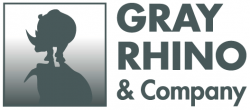Lately a lot of my time has involved interviewing people from many professions and walks of life about how they see risk. One big theme keeps coming up: that staying in your comfort zone is the biggest risk you can take. Several people have said almost the exact same thing, though each has used slightly different words. So when I read the reviews of Forever, the new Amazon Prime series which Wired has called “awesome,” The New York Times deemed to be “thrilling,” as other publications echoed similar sentiments, I was intrigued. Of course, it didn’t hurt that the show…
Author: Michele Wucker
It’s that time again –the barrage of top-risks lists and forecasts for the coming year. When the air has cleared in a few weeks, I’ll issue my fourth annual “top gray rhino risk” meta-analysis: sorting through dozens of lists and identifying trends among them. (Here’s my 2018 wrap-up with links to past lists.) But this week, I want to focus on a few of my favorites and the worries that they detail. You may have caught the news Monday that China’s President Xi Jinping warned senior Communist Party officials to stay alert for gray rhino risks, among which he mentioned debt-laden “zombie firms,”…
China must be on guard against highly improbable, unimaginable “black swan” events while also fending off highly probable but often neglected “gray rhino” risks, Chinese President Xi Jinping told senior Communist Party officials at the opening ceremony of a study session at the Party School of the CPC Central Committee January 21st. Xi spoke shortly after newly released economic data showed that in 2018 China’s economy had slowed to the lowest rate in 28 years. “In the face of a turbulent international situation, a complex and sensitive environment, and the arduous task of reform … We must be highly vigilant…
I rang in the new year with a quick trip to Beijing for a few speeches and media appearances. It was an interesting time, given concerns over the trade war with the United States and the Chinese government’s efforts to manage a slowing economy. From reading most Western media, you might think all of the economic slowdown was the fault of the trade war. Only a few Western commentators “get” that China’s slowdown is the result of sensible, deliberate policies designed to slowly let the air out of credit bubbles instead of pumping them bigger until they pop. China’s economic…
In November, I wrote here about my courageous friend Mina Guli. Mina who set out on a quest to run 100 marathons in 100 consecutive days around the world to draw attention to water scarcity, which the World Economic Forum ranks among the top global societal risks in terms of impact. Mina’s journey has taken an unexpected but ultimately inspiring turn. In early January, weeks of running in pain forced Mina to downgrade her speed to walking, now taking nine to twelve hours to finish each marathon instead of four to five. She tried shuffling and using walking poles to help, but her journey…
Gray Rhino & Company CEO Michele Wucker spoke at the Netease Impact Summit in Beijing January 5, 2019, on the impact of the Fourth Industrial Revolution on the future of work. Watch and find a transcript at this link: https://3g.163.com/money/article/E4ON4CTB00259CBS.html
Michele Wucker talks with the FT’s Matt Klein about why we don’t deal with problems we see in advance – and how to fix it- on the January 18, 2018 edition of FT Alphachat, the conversational podcast about business and economics produced by the Financial Times in New York. Each week, FT hosts and guests delve into a new theme, with more wonkiness, humour and irreverence than you’ll find anywhere else. LISTEN HERE. After Chinese President Xi Jinping’s annual New Year’s address, it has become an annual tradition for Chinese media to scour his bookshelf for new titles. In 2018, the…
How has the world been doing in confronting its most obvious but unresolved risks in 2018? This was the third year that Gray Rhino & Company compiled a list of top Gray Rhino risks –a meta analysis of dozens of top risks lists– and tracked how the most obvious yet unresolved risks have evolved throughout the year. It’s time for an end-year wrap-up, which follows the trends we identified in our mid-year review over the summer. Analysts broadly agreed at the beginning of the year that the top risk was monetary policy errors. How well the world did in addressing this depends on how you…
You may have read the news that University of Illinois Urbana-Champaign recently took out an insurance policy to protect itself from a steep fall in Chinese student enrollment in case of a visa policy or other external shock. The university estimates that it would lose $60 million a year were it to completely lose Chinese students, who generally pay full tuition and thus help to subsidize American students. The increasingly heated rhetoric about China and the nosedive in the relationship between the two countries certainly ups the risk of a drop in Chinese student enrollment. But it’s part of a much bigger…
As George H.W. Bush is laid to rest, Americans mourn a man who – even to many of those who disagreed with him on policy – represented an era of greater civility and cooperation, and putting the greater good above one’s own interests. It’s hard to forget his famous campaign pledge, “Read my lips: no new taxes,” or the consequences of his breaking that pledge. Of course, in the autumn of 1990 he went back on his words. But if ever there was occasion to break a promise, this was one. Interest rates were rising, supply side economics were not…

